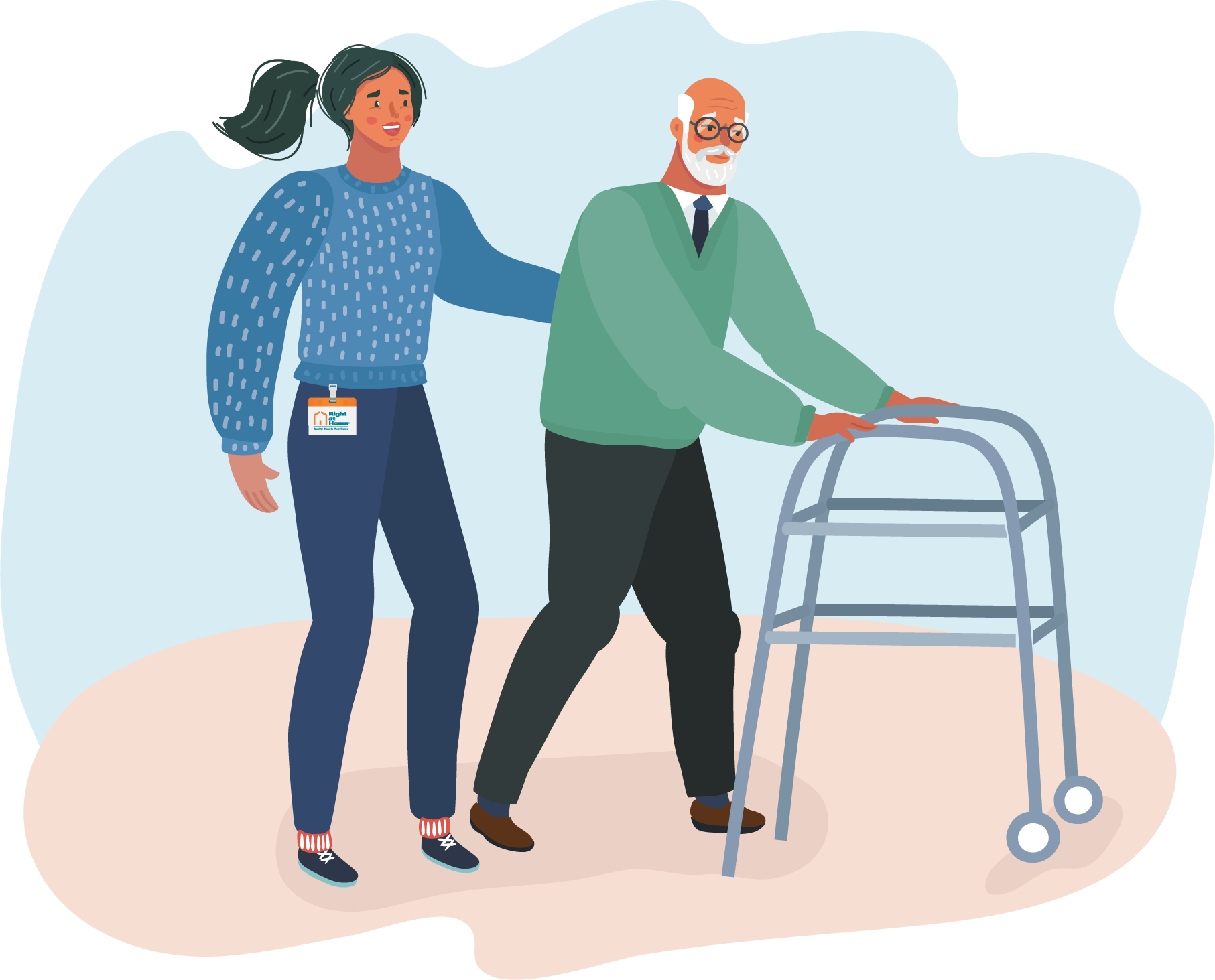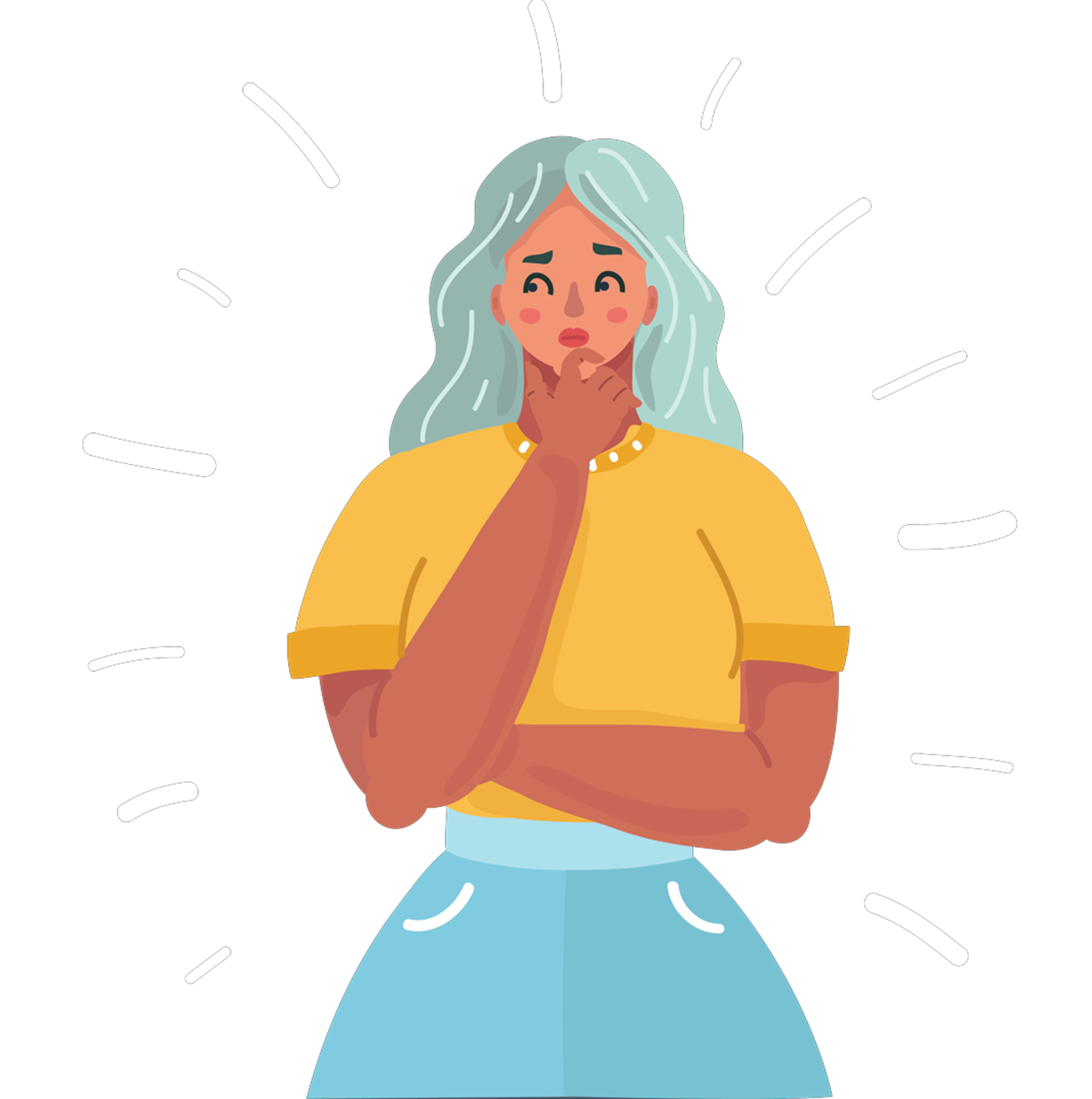Simple Guide to Falls Prevention
Falls are a common but often overlooked cause of injury. Read on for tips and information on how you can help prevent falls in your own or in a loved one’s home.

Published: 11/01/2024
Simple Guide to Falls Prevention from Right at Home Eastbourne and Bexhill
As we grow older, our muscles and bones lose strength and weaken, making falls more likely. Statistics show that one-third of people over the age of 65 experience a fall at least once a year, rising to half of people over the age of 80. Over half of all falls happen at home and many result in hospital admissions, making falls prevention a very high priority for both the NHS and social care providers.
At Right at Home Eastbourne and Bexhill, we strive to support our Clients and their families to prevent falls at home. Read on for an introduction to falls prevention and how you can help yourself or a loved one to keep safe and active.
Common causes of falls in the elderly:
A fall incident due to tripping on a rug, slipping on a wet surface, or just loosing balance while moving too fast can have a life-changing impact and many older adults understandably have a fear of falling, even if they have never experienced it before. They may alter their habits and behaviours and start avoiding activities such as participating in social activities, going for walks, or do tasks around the house. But keeping active is important to keep your body healthy, so try not to let your fear get the better of you.
Some falls are caused by hazards in the home, others by personal risk factors. Identifying the potential risks is the first step to prevent falls from happening in the first place. So, which are the most common reasons for falls in the home?
- Age-related muscle weakness and slower reaction times
- Not enough physical activity, leading to loss of muscle mass and balance
- Impaired vision
- Medication side effects
- Pre-existing health conditions, such as heart problems
- Dizziness when standing (postural hypotension)
- Poor nutrition and dehydration
- Environmental factors, like loose rugs, poor lighting or uneven steps
- Wrong footwear
- Incontinence, causing a person to rush to the toilet
The list is far from exhaustive but gives a good general idea of the things to be aware of.
How can I prevent falls at home?
Thankfully, there are many ways in which you can prevent falls from happening in or around the home. Minor changes and adjustments to your routines or living environment can help you build your confidence and prevent further, future falls.
Improve lighting
Inadequate lighting in the home can make it difficult to spot and avoid hazards which can increase the chance of falling. Shadows and low light can cause visual confusion and make you misstep. To improve the visibility in your home, you might consider:
- Installing more light sources in areas such as stairways, halls and darker rooms
- Using high wattage bulbs
- Replace yellow light bulbs with white light bulbs – it might not look as warm, but you will be able to see better
- Installing motion-triggered lights by the front door and in any outside areas
Reduce clutter and remove falls hazards
Clutter can get in your way, and having to navigate around obstacles can increase the risk of falling. To make sure your home is as easy to get around as possible, you can:
- Remove lose rugs and obstacles like trailing cables from the routes you use the most, for instance from bedroom to bathroom
- Store items that are rarely used in clearly labelled storage boxes
- Arrange your cupboards and wardrobes so that you can easily reach items you use on a regular basis, such as your normal daywear, breakfast cereal, tea etc, without having to bend or stretch
- Ensure curtains aren’t trailing on the floor
- Clear up spills immediately
- Remove scatter cushions that can fall on the floor causing you to trip over
- Remove casters from tables and chairs to make them more stabile
Exercise regularly, eat healthily, and get enough sleep
Taking regular exercise and eating nutritious food both play an important role in increasing wellbeing and directly affect our physical and mental health. However, there is no “one size fits all”: the type, duration and intensity of the activity should be adapted to the individual.
- Your GP might be able to prescribe you a specific exercise programme designed to target falls prevention. Weight bearing exercise improves bone density and is especially important for women, who are more at risk of osteoporosis. Even light activities such as getting up to make a cup of tea or walking at a slow page will help to maintain muscle strength, as will chair yoga.
- Increase your protein intake – protein helps build muscle and keep them strong, but it can be difficult to enough in your diet, especially if you have a small appetite. The NHS website have lots of information on how you can include more protein in your food intake. Make sure to drink enough fluids, but you can alternate between sources, like water, flavoured water, squash, tea, and milk. Reduce your alcohol intake as alcohol can impair balance. Review your Vitamin D levels: not being able to get outside regularly can cause a Vitamin D deficiency due to lack of exposure to sunlight, which can cause bones to become brittle. Talk to your GP about supplements, which can be a simple solution.
- Get enough sleep and make yourself as comfortable in bed as possible: a change in mattress or pillow can give you better quality of sleep, which can reduce you feeling tired or dizzy during the day.
Book in with your health professionals
Worsening eyesight and hearing can make you less likely to spot hazards and more prone to being startled. You do not need to ask for a referral from your GP for these services, but you may want to discuss any additional services that can be useful to you:
- Book regular eye and hearing tests to ensure you spot signs of deterioration early, wear glasses or contact lenses as your optician advises and, if you use a hearing aid, make sure it is working properly and use it as often as much as possible.
- If you are on regular medication, ask your GP for a review to discuss side effects and relative contraindications – how medicines interact with one another – and make sure you understand as fully as possible what you are being prescribed and why. Some medicines can cause dizzy spells or sleepiness, which can affect your balance.
- Make an appointment with a chiropodist; healthy, pain-free feet will help you keep mobile. A chiropodist – or podiatrist, if you have been referred by your GP – can advise on good footwear.
What should I do if I have a fall?
A sudden fall can be frightening and upsetting. If you do fall, try to stay calm and remain where you are until your breathing has slowed.
Check for injuries: It can take a few minutes for you to become aware of any pain, so wait for a little while and then try to assess if you have hurt yourself in any way. Getting up too quickly or incorrectly may make an injury worse.
What to do next: If you are hurt, or if you feel unable to get up off the floor, call out for help, dial 999 if you have your mobile or cordless within reach, or press your Lifeline for assistance. If you are on your own, try to keep warm and comfortable until help arrives.
If you are not hurt and feel well enough to try and get up, you can follow the NHS guidelines:
- Roll onto your side
- Push yourself up to a sitting position
- Slowly get on your hands and knees
- Crawl towards a sturdy piece of furniture that can support you to get up, such as an armchair or sofa
- Kneel side-on to the piece of furniture with your strongest leg next to it, then slide the foot of your strongest leg forward so that it’s flat on the floor. Your other knee should remain on the floor
- Put both hands on the chair or sofa
- Raise and turn your body, pushing through your hands and foot until your bottom is safely on the chair or sofa.
Even if you did not injure yourself or feel any pain afterwards, always contact your GP to let them know that you have had a fall. A fall can alert your GP to a new medical problem, and they may initiate a review of your medications or advise you to have your eyesight checked, to help correct any underlying issues.
How can Right at Home Eastbourne and Bexhill help?
Here at Right at Home Eastbourne and Bexhill, we carry out a risk assessment as part of our initial care assessment. This assessment is specifically designed to mitigate risks and make recommendations that can support the safety of our Clients living at home, as well as understand how we can best support you. For more information about our care services or to book a home assessment, contact us today on 01323 414 658 or request a callback.

